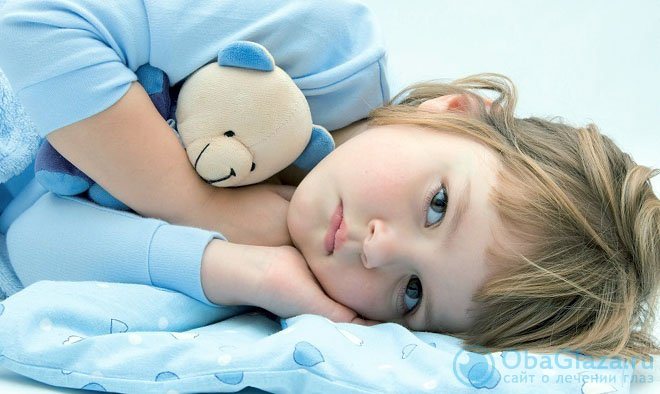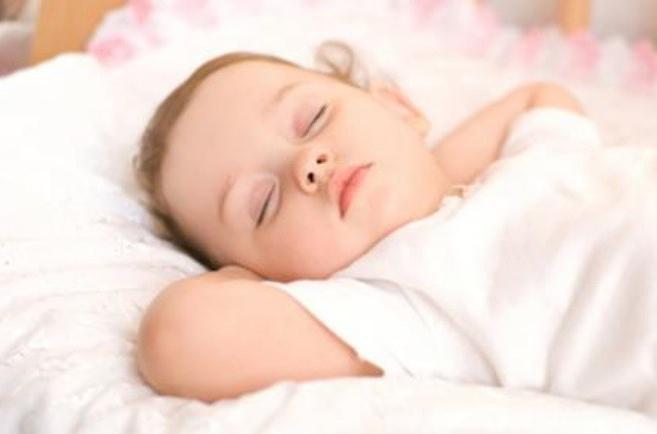What is the norm
Sleeping with half-open eyes is considered normal when the baby moves from one phase of rest to another. While asleep, the baby moves his eyelids without controlling the impulse. Involuntary movements are also observed in children from birth to school age with physiological urges during sleep:
- wants to go to the toilet;
- limbs become numb, the body requires a change of position;
- pain occurred. A baby may have a tummy ache, a schoolchild may have a headache or muscles after a physical education lesson.
At this time, the little one is no longer sleeping soundly, he goes into a drowsy phase, a half-asleep state. Babies often squint, roll their eyes or one eye when they smile, laugh, or babble in their sleep. But at the same time they sleep sweetly. This is also considered the norm.
Somnambulism in children
If a two-year-old child sometimes sleeps with his eyes open, parents should take the problem seriously. According to experts, this may signal the presence of a disease such as “sleepwalking” or somnambulism. People with this type of illness can talk in their sleep, walk, and even perform some actions without being conscious. In this case, a two-year-old child can remain in a state of somnambulism from several minutes to an hour.
Symptoms of sleepwalking include:
- Sleeping with half-open eyes;
- Slurred speech during sleep;
- Walking around the room in your sleep;
- Inability to remember anything that happened;
- Disorientation in space after sudden awakening.
Why is this condition dangerous? Sleepwalking children can injure themselves during their nightly adventures.
Unfortunately, in medical practice there have been cases when “sleepwalkers” fell out of balconies, fell from stairs or roofs. Therefore, if you notice similar symptoms in your child while sleeping, be sure to consult a specialist.
What is somnambulism
Among the people, actions that a person performs in a state of sleep and does not remember anything afterwards are called sleepwalking; official medicine gives its own definition - somnambulism. This condition occurs in the deep sleep phase and lasts from 2 minutes to 1 hour. The danger of this disease is that the baby can be injured during his movements, and he often does this with his eyes half open.
Parents need to seriously think about how to help a baby who sleeps poorly, first of all, follow the doctor’s advice and do an encephalogram of the brain, as well as examine the blood vessels, then get a detailed diagnosis of the fundus from an ophthalmologist. Based on the results, the pediatrician will prescribe adequate treatment with immunosuppressive and sedative therapy.
You will need to pay more attention to your child before bed: give him a relaxing massage with essential oils (mint, lavender); a soothing mixture is also recommended, which is brewed and drunk at night. If tension does not subside for a long time, brew lemon balm, valerian, motherwort herbs in arbitrary proportions and give the solution to the child throughout the day.
When somnambulism bothers you every night, the doctor will prescribe sedatives for the baby, and in the most severe cases, tranquilizers. Sleepwalking can occur suddenly, due to a single nervous shock, when fear creeps into the baby’s subconscious, he will move his eyelids in his sleep, sleep with his eyes open or half-open.
Sleep Features
Why does a small child often sleep with his eyes open?
To understand this issue, it is worth considering the mechanism of sleep itself, which consists of two phases: fast and deep. At the moment when the body enters the deep sleep phase, the nervous system turns on an autonomous mode, as a result of which all muscles completely relax, and breathing becomes smoother and deeper.
But in order to reach such a state, the baby must overcome the first stage of shallow sleep.
It is at this moment that the baby’s limbs may twitch a little, and the baby himself may scream or moan. At this stage, the baby often sleeps with his eyes open or half-open. Unfortunately, the exact cause of this phenomenon has not been established by doctors, but in most cases this behavior does not pose any danger to the health of newborns and children under two years of age.
Why does a newborn sleep with his eyes open?
Many mothers are concerned about the question: why does a newborn sleep with his eyes open? A small bundle of joy brought into this world gives the new mother many problems and reasons for concern. From morning to evening, she tries her best to make the baby comfortable and cozy. Few mothers manage to get through this period without unnecessary stress.
Particular attention is paid to how the baby sleeps, because now this is one of his main activities. This article will tell you about the main reasons for this unusual phenomenon and what parents should do.
Features of children's sleep
The exact reasons for sleeping with half-open eyes in children have not yet been established. Most doctors claim that the explanation for this fact lies in the innate characteristics of the child’s body.
Currently there are four main reasons known:
- heredity;
- emotional and physical fatigue;
- somnambulism;
- lagophthalmos.
Hereditary diseases often occur in young children. To rule out this reason, you need to find out from your parents, mom and dad, what your dream was like, and whether they noticed any similar features.
If the question arises why a newborn sleeps with his eyes open or half-open, remember the whole day in order. Perhaps the baby is simply overtired emotionally or physically. Brain cells also have the ability to get tired, so the eyelids cannot close completely.
Somnambulism, popularly called sleepwalking, manifests itself in older age. The peak development of this disease occurs between four and eight years of age. If your baby sits up or gets up with his eyes open at night, but continues to sleep, then you need to consult a specialist. Somnambulism can pose a serious danger and be a precursor to serious illnesses. In this state, the baby unconsciously moves around the room, and this can cause injury or more tragic consequences.
Lagophthalmos is not a cause related to sleep disorders. This is rather an ophthalmological problem that appears as a result of viruses or injury. Lagophthalmos can also be a manifestation of central nervous system disorders.
According to doctors, if a baby sleeps with his eyes slightly open until he is two years old, then this is considered normal. But only in the case when this phenomenon does not occur daily, but at least once a week.
Possible consequences
If a newborn opens his eyes in his sleep, there is no need to worry: most often, all symptoms disappear completely as they grow older. Episodes of sleep with raised eyelids can persist only with severe overexcitation or emotional stress.
Complications may vary depending on why the baby opens his eyes without waking up. Children with somnambulism may develop epileptic seizures and disrupt brain function.
With lagophthalmos, it is necessary to determine the cause: the condition itself will not lead to a decrease in visual acuity, but the pathologies that cause it often negatively affect the visual organs. Myopia develops, inflammatory processes are often observed that are difficult to treat, ulcerative lesions and clouding of the lens are possible.
Oncological pathologies are dangerous. Benign tumors can develop into cancerous ones. In addition, lesions localized in the head area will put more and more pressure on the brain as they grow, causing various abnormalities in the functioning of internal organs, worsening general well-being, and causing severe pain.
Other reasons
Sometimes there may be exceptions that indicate that parents should be interested in the baby's health. Do not panic; it is recommended to consult a doctor and find out the exact causes of this phenomenon.
Why does a child sleep with his eyes slightly open? The reasons may be the following:
- somnambulism;
- predisposition passed on from parents;
- lagophthalmos;
- mental stress.
If the baby’s parents were also exposed to this phenomenon, then there is no reason to worry, since everything will pass in a year and a half, after which the baby’s sleep will finally return to normal.
Reasons for children sleeping with their eyes slightly open
reasons for sleeping with your eyes open
According to obaglaza.ru, there can be many reasons why this happens. As a rule, possible reasons for a child sleeping with his eyes open can be the following:
- The transition of sleep from one phase to another;
- Emotional overexcitement;
- Somnambulism;
- Lagophthalmos (typical of children under 2 years of age);
- Genetic predisposition;
- Physiological underdevelopment of the eyelid;
- Neurological disorders.
Sleep phases

sleep phases
When a baby's sleep moves from a rapid phase to a deeper one, the child may move, moan, shudder, and his eyes may open slightly. When sleep enters the deep phase, all the baby’s muscles will relax, he will calm down and become quiet, and his eyes, as a rule, will close on their own.
Emotional overexcitement
Emotional overexcitation, according to ObaGlaza.py, arises from a large number of new positive impressions received during the day: trips to interesting places, attention from a large number of people, receiving new toys. Negative impressions that disrupt a calm and sound sleep include: a change in daily routine, separation from parents, and others. The cause of stress depends on the age of the baby.
If the child is over 2 years old, then to determine the exact reason why he can open his eyes in his sleep, you should contact a pediatrician who will conduct a diagnosis and prescribe appropriate treatment.
Somnambulism in children

Somnambulism in children
Somnambulism (sleepwalking), according to Obaglazaru, usually manifests itself in children aged 4 to 8 years. The child can not only lie with his eyes open, but even sit or stand. The state of somnambulism can last for several minutes, an entire hour, or even longer. In such situations, you cannot wake up the baby: he may get scared and get psychological trauma.
Usually, somnambulism goes away with age, but it is better to visit a doctor, because this may indicate the presence of a dangerous pathology. The pediatrician will give directions for a Doppler ultrasound of the cerebral vessels, an electroencephalogram, and an ophthalmologist who will examine the fundus of the eye.
The main causes of sleepwalking
- Incorrect daily routine;
- Lack of sleep, fatigue;
- Stressful conditions caused by fear, unfavorable atmosphere in the family (screaming, swearing), parental divorce, etc.
During a consultation with a doctor, relatives will have to remember any negative episodes in the child’s life, stress, psychological trauma, or illness.
The main danger of somnambulism, as ObaGlazaRu notes, is that a sleeping baby can perform unconscious actions, walk around the apartment and accidentally injure himself: hit a piece of furniture, trip, fall, fall out of a balcony or an open window.
To treat somnambulism in children, the doctor may prescribe medications that have sedative properties. In more complex cases, sleeping pills and even tranquilizers are prescribed.
Lagophthalmos in newborns
Lagophthalmos is a phenomenon that occurs in many newborns and is not a deviation. The baby is in a state of active sleep most of the time, while the eyeballs move, roll back, and the eyelids rise. If mom or dad is worried about the newborn sleeping with his eyes open, you can close them with a light touch of your hand.
The baby stops sleeping with his eyes slightly open after reaching 1-1.5 years. However, lagophthalmos can periodically occur in children under 2 years of age during sleep. This is considered the norm, but only if the baby sleeps with his eyes open not every day, but once a week. Lagophthalmos may be a symptom of a disorder of the central nervous system.
Genetic or hereditary predisposition
As a rule, if the parents had the same problems, then the child could inherit this way of sleeping. In this case, parents should not worry, since, as far as obaglaza.ru knows, after 18 months, you will forget about the problem with your child’s eyes.
Physiological underdevelopment of eyelids
Another and less common reason, according to ObaGlaza.ru, may be underdevelopment of the eyelids, for example, drooping of the lower or upper eyelid, difficulty closing them due to pathologies in their development or dysfunction of the muscles.
Neurological disorders
Such reasons include both an injury to the eyelids and a congenital abnormality. Opening of the eyes can occur, for example, with involuntary eye movements, disruption of the passage of nerve impulses and muscle spasms, etc.
How Dr. Komarovsky explains the phenomenon
Many parents notice that their child sleeps with his eyes slightly open. Why does this happen and what does it mean? This situation is very alarming, and sometimes even frightening for inexperienced mothers and fathers who do not know the peculiarities of children's sleep. What happens to their child? How serious is this condition and does it require any special treatment? Is infant sleep with eyes slightly open considered a disorder? More on this later in our article.
A child's sleep, like that of an adult, consists of several phases that change throughout the night. This:
With the eyelids not completely closed, the newborn sleeps only during the REM phase of sleep, since at this time his brain is still actively functioning. During this period, twitching of arms and legs, groans, screams, and accelerated eye movements occur. REM sleep comes first and only then does the deep stage begin, into which the baby plunges.
Sleeping with half-open eyes is considered normal until the baby is 1.5 years old. After this, the phenomenon should stop. Otherwise, it is considered a violation and requires consultation with a therapist.
During sleep, the child's eyes may be fully or slightly open. The reason for this may be:
A stressful situation usually occurs due to poor nutrition, teething, prolonged separation from the mother, lack of breastfeeding, moving, and conflicts in the family.
The gene factor also often causes children to sleep with their eyes open. In most cases, this does not pose any threat to the child’s health and goes away on its own when the baby reaches the age of one and a half years. However, it also happens that such a dream provokes the development of somnambulism and lagophthalmos. More about this.
Somnambulism is one of the reasons why a baby sleeps with his eyes slightly open. Popularly, this disease is called sleepwalking. Suffering from this disease, a preschooler may perform some actions in his sleep and not be aware of what he is doing.
In most cases, sleepwalking in children develops around the age of 6 years. A child's attack can last from one minute to several hours. At this time, the baby can walk, rearrange toys, hide things, and after waking up he will not remember any of this.
Sleepwalking is considered a dangerous disease, as it poses a threat to the child’s life. A baby may injure or injure himself during an attack. There are many known cases where children, traveling in their sleep, fell out of windows and fell down stairs. Among the many causes of sleepwalking, the most common are:
- excessive fatigue;
- daily stress and constant feelings of anxiety;
- regular lack of sleep;
- non-compliance with the daily routine.
- cicatricial eversion of the eyelids;
- heredity;
- inflammation of the salivary glands located in the ear area;
- underdevelopment of the century;
- inflammation of the facial nerve, which prevents the eyelid from completely drooping;
- development of exophthalmos.
To understand why a newborn or infant sleeps with their eyelids open, parents will have to seek help from several specialized doctors. Initially, a small patient should be examined by a pediatrician.
If the child's eyelids do not close during rest, parents should seek advice on this matter from an ophthalmologist. During the diagnostic process, the specialist will assess the condition of the eyeball and, if necessary, prescribe appropriate therapy. In addition to the ophthalmologist, it is advisable for parents to take their child to see a neurologist, since such sleep problems may indicate the presence of neurological disorders.
For some children, sleep problems go away as they get older and do not require any treatment. However, this does not mean that parents can do nothing. They must do everything to ensure that their baby sleeps as peacefully as possible. To do this, you need to create a special schedule for the baby to go to bed. For example:
In addition, the baby needs to fall asleep at approximately the same time. Before going to bed, he should not experience any worries or stress.
- before going to bed, bathe the baby (if he does not have allergies) in water with the addition of an infusion of soothing herbs;
- make sure that the child does not go to bed hungry;
- eliminate all sources of sharp sounds in the children's bedroom;
- do not wake the baby during an attack;
- try to put him to bed so that he doesn’t wake up;
- in case of frequently recurring attacks, put her to sleep next to you.
Dr. Komarovsky is convinced that there is no cure for this disease. Parents can only be patient and wait until the illness goes away on its own. This usually occurs before the child reaches the age of 15.
Characteristics of children's sleep
Like adults, children's sleep consists of two stages.
We are talking about the fast and deep (slow) phase. If the baby is in the deep sleep stage, his body is resting. This includes completely relaxing the brain and nervous system. Breathing evens out and slows down. During the rapid phase of sleep, the nervous system and brain do not rest; they actively work, analyzing the information received during the day. It is during this period that babies dream. The above phases in children replace each other much faster than in an adult. At the same time, infants often twitch, clench their fists and make other involuntary movements. As for the eyeballs, they also rotate all the time and in some cases remain uncovered or not completely covered.
From the outside it seems that babies sleep with their eyes slightly open. Pediatricians say that this phenomenon completely disappears by the 18th month of life. If we talk about older children, they can also doze with their eyes open. But this happens extremely rarely and is usually associated with:
- excessive fatigue;
- strong excitement.
Associated symptoms include anxiety, talking in your sleep, screaming, and so on. If sleep with open eyelids is detected in a child aged 1.5 years or older, you need to contact a specialist. In this case, this phenomenon is usually caused by neurological abnormalities, mental disorders, as well as underdevelopment of the eyelid covering the eye.
Lagophthalmos
Another disease that is characterized by slightly open eyelids during sleep. Lagophthalmos has an ophthalmological etiology - this is a condition in which a child simply cannot completely close his eyes. But if during the day this is not noticeable due to blinking, then at night parents clearly see the presence of pathology.
The disease can be caused by a number of factors:
- Inflammation of the facial nerve;
- Congenital incomplete development of eyelids;
- Congenital or acquired forward displacement of the eyeball;
- Cicatricial eversion of the eyelids.
The most common cause of slightly open eyes during sleep is precisely congenital underdevelopment of the eyelids, which goes away with age. But if the child has crossed the two-year mark, then the disease cannot be left to chance.
Treatment involves diagnosing and getting rid of the cause of the disease. During therapy, additional eye protection products are prescribed - drops, ointments, protective bandages. In difficult cases, surgical intervention is necessary.
Eye disease

Ignoring this problem can lead to the development of conjunctivitis, ulcerative keratitis and other eye inflammations in the baby. The disorder is accompanied by constant discomfort and dry eyes, but as one gets older it often disappears on its own. The reasons for this disorder in children may be:
- congenital underdevelopment of the eyelids;
- cicatricial eversion of the eyelids;
- inflammation of the facial nerve;
- exophthalmos;
- inflammation of the optic nerve.
If a child sleeps with his eyes slightly open until a certain age, parents should not worry. You need to sound the alarm when the baby does not close his eyes at all during sleep. With such a violation, it is necessary to consult a pediatric neurologist and ophthalmologist.
Neurological and neurotic disorders
Neurological conditions that cause a child to sleep with their eyes slightly open may be caused by eyelid injury or congenital pathologies that cause muscle spasms or disrupt the passage of nerve impulses. In such cases, careful examination and treatment by a pediatric neurologist is necessary.
As for neurotic disorders that interfere with healthy sleep, the problem of hyperactivity and emotional instability in children is especially relevant today. Too many irritants surround a baby in the modern world
It is important to protect and not overload the unstable psyche with an excess of impressions - both positive and negative. It is unacceptable to swear or speak in a raised voice in front of a child.
Prolonged exposure to bright lighting, the TV on, and loud music has a negative effect on the baby's psyche.
Contacting specialists
If you are concerned about the state of your offspring's sleep, you observe periodic or frequent sleepwalking in him, then you should consult a specialist. But which doctor should I make an appointment with? After all, no one wants to simply waste their precious time.
So, in solving the problem of sleeping with your eyes open or sleepwalking, you will be helped by:
- children's pediatrician;
- ophthalmologist;
- neurologist;
- neuropsychiatrist.
First of all, you should contact your pediatrician. At your doctor's appointment, talk about your observations and express your concerns. If the doctor decides that the problem is serious, he will refer you and your baby to highly specialized doctors, such as a neurologist or an ophthalmologist. When you come to see these specialists, feel free to talk about your problem. The more your doctor knows, the faster he can help you.
If there have been recent negative shocks in your family life or in the life of your baby, your pediatrician will most likely refer you and your child to a neuropsychiatrist for further treatment of somnambulism.
Pathology
Some doctors believe that sleeping with your eyes open may be a sign of:
- facial nerve damage;
- various types of tumors;
- problems with the thyroid gland.
However, all these indications apply primarily to adults or older children.
Congenital malformation of the eyelids is quite rare; it may be associated with the size and position of the eyelid, as well as the mechanisms of its movement.
Advice and recommendations from experts
To normalize the situation, doctors recommend the following to parents:
- A baby up to one year old needs to be fed before bedtime.
- Preface your night's sleep with relaxing procedures - a bath, quiet games, light strokes on the back and tummy.
- Lay your baby down in natural clothes so as not to disrupt thermoregulation and not overheat the baby's body.
- Do not swaddle your baby tightly, but rather abandon this idea.
- Maintain a normal temperature in the sleeping room and regulate the humidity.
- Dry and ventilate pillows and mattress.
- Put the baby in bed until he falls asleep so that the baby does not feel the parent leaving.
Sleeping with eyes open in the first years of a child’s life is not a pathology. For most children this goes away quickly. If the condition is aggravated by neuroses, respiratory arrest or convulsions, then you need to consult a doctor. Open eyes become a manifestation of underlying health problems. Do not despair - with early diagnosis, most problems are eliminated without a trace in a conservative way.
Is it worth sounding the alarm?
You should be concerned and seek medical help if:
- After 2 years of age, a child always sleeps with his eyelids slightly open, constantly wakes up, and cannot fall asleep for a long time.
- The baby sleepwalks (walks, sits on the bed), and in the morning does not remember anything.
- In addition to sleeping with eyes slightly open, the baby exhibits other developmental abnormalities.
In other cases, with children under 1.5–2 years of age, if the eyes are rarely open at night (1–2 times a month) and alarming symptoms are observed less frequently with age, panic will be unnecessary. It is enough to independently analyze the rhythm of the child’s life, identify the causes of the strange illness and eliminate them.
Sleep mechanism
The peculiarities of human sleep lie in its several phases, which alternately change throughout the night.
Sleep consists of periods:
- deep sleep;
- REM sleep
https://www.youtube.com/watch?v=PiOkDm_Sbiw
The child sleeps with his eyes slightly open only during the surface phase, since at this time his brain is still active. This period is often accompanied by twitching of the limbs, uttering moans or screams, and rapid eye movements. REM sleep occurs first, and only after it does the child, like an adult, enter the deep sleep phase. At this time, all muscles relax, breathing evens out and slows down. Usually at this time the eyes are already completely closed.
In general, this behavior is considered normal in children under two years of age. Experts say that this is a peculiar consequence of the formation of the body and it completely disappears with age.
Top 10 tips on how to get a good night's rest
These are simple and obvious truths that do not need to be reminded to caring and loving parents. But sometimes adults are too busy with their own problems and miss some nuances, or consider them not particularly important. But for the child’s psyche and healthy sleep they are of enormous importance:
- A clear and established bedtime.
- Calm conversations before bed, talking about daytime problems that need to be resolved.
- Favorable environment in the family, exclusion of scandals and quarrels, corporal punishment for offenses, absence of loud sounds and dim lights 1.5-2 hours before bedtime.
- Obligatory bathing or at least washing and brushing your teeth. This can be done as a ritual to calm the nervous system.
- Dark and cool room, comfortable and clean bed.
- Reading or meditative music, but not horror or action films. Especially not exciting computer toys.
- A short walk before going to bed or thoroughly ventilating the room.
- A balanced evening diet without foods harmful to the nervous system.
- Soothing herbal teas or herbal remedies.
- A loving father or mother waiting for the child to fall asleep.
https://www.youtube.com/watch?v=
Psychologists advise working with your child at the slightest opportunity, avoiding conflict situations, screaming and scandals. At any age, they need care and affection, patience and attention. Perhaps then there will be no particular reason to contact medical specialists and watch with fear that children’s eyes are open in their sleep.









